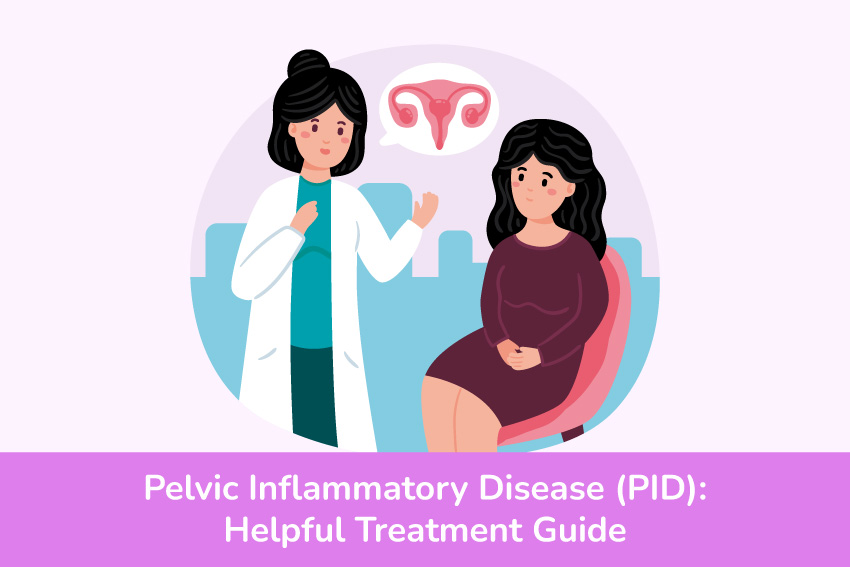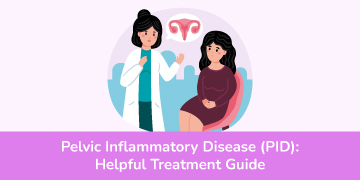
Pelvic pain, irregular discharge, and fever can understandably cause unease, especially when considering a condition as serious as pelvic inflammatory disease. Think about how many women silently worry: “How do I know if I have PID, and could my fertility be at risk?” Pelvic inflammatory disease is an infection that targets the female reproductive organs, such as the uterus, fallopian tubes, and ovaries. Left untreated, PID can lead to chronic pelvic pain, infertility, or life-threatening complications, making rapid diagnosis and medical intervention absolutely essential.
A] What Is Pelvic Inflammatory Disease (PID) in Women?
PID in women is an infection of the upper genital tract, including the uterus, fallopian tubes, and ovaries. The majority are the result of sexually transmitted infections (STIs), such as chlamydia and gonorrhoea, although other bacteria can also cause PID. The infection damages the reproductive system, often causing scarring or blockage in the fallopian tubes. It may result in complications with pregnancy, including failure to conceive or chronic pelvic pain.
Early treatment matters! Schedule your visit with our gynaecology expert now.
B] Pelvic Inflammatory Disease Medication Options
Antibiotics (First-Line Treatment)
Once PID is suspected, clinicians start pelvic inflammatory disease medication immediately; delaying even for testing can affect the outcome. A combination of antibiotics covers the variety of bacteria that may be involved: typically, oral doxycycline and metronidazole for 14 days, sometimes starting with a single injection of ceftriaxone or cefoxitin. This combination ensures coverage against pathogens such as chlamydia, gonorrhoea, and anaerobic bacteria—helping halt infection rapidly. According to NHS and NICE guidelines, all medication should be completed for the full 14 days, even if symptoms improve in just a few days. Failure to finish can lead to relapse or chronic problems.
Common Treatment Regimens:
- Ceftriaxone 500 mg IM (single dose) + Doxycycline 100 mg orally twice daily for 14 days + Metronidazole 500 mg orally twice daily for 14 days.
- Severe cases may start with IV antibiotics (see hospital section), then switch to oral once stabilised.
Hospital Treatment for Severe Cases
Hospital admission is necessary for those with severe symptoms, such as high fever (>38.5°C), vomiting, pelvic abscess, pregnancy, or if oral therapy fails. Therapy may include:
- IV Ceftriaxone, Doxycycline, Metronidazole
- Alternative IV agents (cefotetan, cefoxitin, clindamycin, gentamicin) for complicated cases.
Rarely, surgery is needed, especially for ruptured abscesses or failure to respond to antibiotics.
Partner Treatment and STI Management
A critical but often overlooked aspect of pelvic inflammatory disease medication is treating sexual partners. Unaddressed partners can re-infect or perpetuate the disease, making partner STI testing mandatory. Abstain from sexual intercourse until both parties have completed treatment and symptoms are resolved. Ongoing STI screening and prompt treatment are vital for recurring cases.
Follow-Up and Expert Guidance
Most clinics, especially reputable centres, advise review after 3 days to check symptom response, and again at the end of antibiotics. If an intrauterine device (IUD) is implicated, removal may be necessary. Persistent symptoms may warrant further imaging or referral to a pelvic pain clinic.
C] How Long Does Pelvic Inflammatory Disease Take To Develop
Pelvic Inflammatory Disease doesn’t appear overnight, but it can develop surprisingly quickly once bacteria reach the upper reproductive tract. For some women, symptoms like pelvic pain, fever, or unusual discharge may emerge within just a few days of contracting an STI such as chlamydia or gonorrhoea. In others, the process is slower; bacteria may linger silently for weeks or even months before damage becomes obvious. This “silent” progression is particularly dangerous because scarring of the fallopian tubes can occur without warning. Regular STI screening and early treatment are the most reliable safeguards.
D] When to Seek Immediate Medical Help
Certain warning signs mean immediate medical attention is critical for PID:
- Worsening pelvic or lower abdominal pain
- High fever (>38.5°C)
- Fainting, confusion, or signs of shock
- Severe nausea or vomiting
- Unusual vaginal discharge (foul-smelling, green/yellow colour)
- Bleeding between periods or after sex
These symptoms of PID in women may indicate the presence of an abscess in the pelvis or the beginning of sepsis, which is a medical emergency. Even mild persistent symptoms are associated with a risk of chronic pelvic pain and infertility. After treatment for pelvic inflammatory disease, any recurrence, enduring discomfort, or fertility concerns should prompt a follow-up with a gynaecologist in London or a visit to a specialist clinic such as Women’s Healthcare.
E] How to Prevent Pelvic Inflammatory Disease
Prevention largely focuses on protection against STIs and early intervention:
- Safe sex: Always use condoms, restrict the number of partners (body count), and do not douche.
- Frequent screening: Most cases of PID may not have any symptoms, especially for chlamydia and gonorrhoea, and therefore, screening is crucial to prevent the manifestation of symptoms of PID in women.
- Early STI treatment: Prompt eradication of STIs before they progress can help prevent PID and its complications.
Partner testing, open communication, and periodic check-ups with a Women’s Healthcare, a private gynaecologist in London, form an expert, long-term plan for pelvic health.
Conclusion
The threat PID poses to fertility, comfort, and long-term health is serious; yet rapid medical response and the right pelvic inflammatory disease medication save many from lasting harm. Always heed early warning signs like pelvic pain or unusual discharge, especially if wondering, “How do I know if I have PID?”. Expert-led care is vital: reaching out to an experienced gynaecologist is essential. Mr Nilesh Agarwal, a private gynaecologist in London, provides access to timely diagnosis, tailored treatment, and ongoing pelvic pain management services. Regular screenings, transparent communication, and vigilant STI prevention put the power of health back into every woman’s hands.
For further information, specific symptom guidance, or to schedule a consultation for pelvic pain in women, contact us or visit Women’s Healthcare.

Neha Goel
Neha Goel, a Psychology alumna and MBA graduate from CASS Business School, London, brings together her expertise as a Reiki Practitioner and Practice Manager. She integrates psychology and business strategies to foster holistic well-being and personal development.

